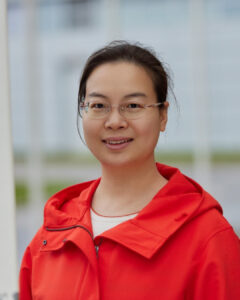Yating Zhou’s Interview
Starting date: 01.02.2023
Nationality : Chinese
Implementing Partner : Forschungszentrum Juelich
Main supervisor: Professor Stephan Förster

Few words about you and your research project
I am now a GNeuS post-doc in Jülich Centre for Neutron Science 1 (JCNS-1) of Forschungszentrum Jülich (FZJ). Before that, I had worked in China Spallation Neutron Source (CSNS) for two years as a post-doc, by using neutron powder diffraction to study organic crystals.
My GNeuS project is about aqueous-based polymer synthesis and characterization. As neutron is more sensitive to light elements (atom number small) than X-rays, and aqueous-based materials contain a large number of C, H, O and N atoms, choosing neutron as the probe technique will be more effective and accurate.
The company BASF will be incorporated in my GNeuS project as a secondment. BASF is a world-leading company in the synthesized polymer market, and experts from BASF could share with me experienced and useful advice and suggestions.
The voice from the industry will give me more perspectives on the commercial market. This would promote the transition from laboratory research into industrial applications, to make the research project more “real”.
My academic record is available on researchgate.
What is your background? How have you heard about GNeuS?
When I did my post-doc work in CSNS, I had the opportunity to learn and use neutrons. CSNS is the first large-scale scientific facility in south of China, and it was put into operation in 2018, the year I earned my PhD degree.
During my PhD study in Cardiff University, I participated in the development of a new scientific technique – X-ray Birefringence Imaging (XBI), which is based on a synchrotron source. These large facilities are usually rear and expensive, so firstly we need to learn how to use it well, then secondly to improve it, e.g., develop new methods to give these facilities more functionality.
JCNS has a good reputation for both neutron science and method development, so it is a good place to be my GNeuS host institute.
I heard about the GNeuS project from a flyer shared by a colleague in CSNS. It seems that lots of people in this field know about this brilliant project.
Why did you apply specifically on GNeuS?
My past research areas are mainly around organic materials, including polymers and small molecular organic crystals. As neutron has its unique advantages in characterizing organic materials, I was fascinated by these magic small particles, and would like to learn more about it.
When my contract with CSNS was close to the end, I heard about GNeuS and I told myself it’s a great opportunity to carry out systematic and in-depth study on neutrons in JCNS.
GNeuS is a well-designed MSCA co-fund project. It contains several different modules to give the fellows a lot of training on different aspects, like teaching, entrepreneurship and soft skills.
Besides, it also emphasizes interdisciplinary and intersectorality. These will enhance the fellow’s scientific ability and facilitate the fellow’s career development.
What impacts do you expect from the GNeuS fellowship?
I expect my GNeuS research project can be implemented smoothly and efficiently, indicating neutrons an effective tool to study aqueous-based polymers. I also expect in the end of this GNeuS program, I could get more improvement in my professional skills and increase my competitiveness in my future job application.
GNeuS program provides us a lot of opportunities to attend meetings and conferences, which enables us to build and expand a good networking within and not limited to the neutron scientists. The compulsory non-academic secondment will also give us a good chance to have the connections with industry.
These approaches will definitely benefit to us as fellows and help us to grow into a good neutron scientist.
